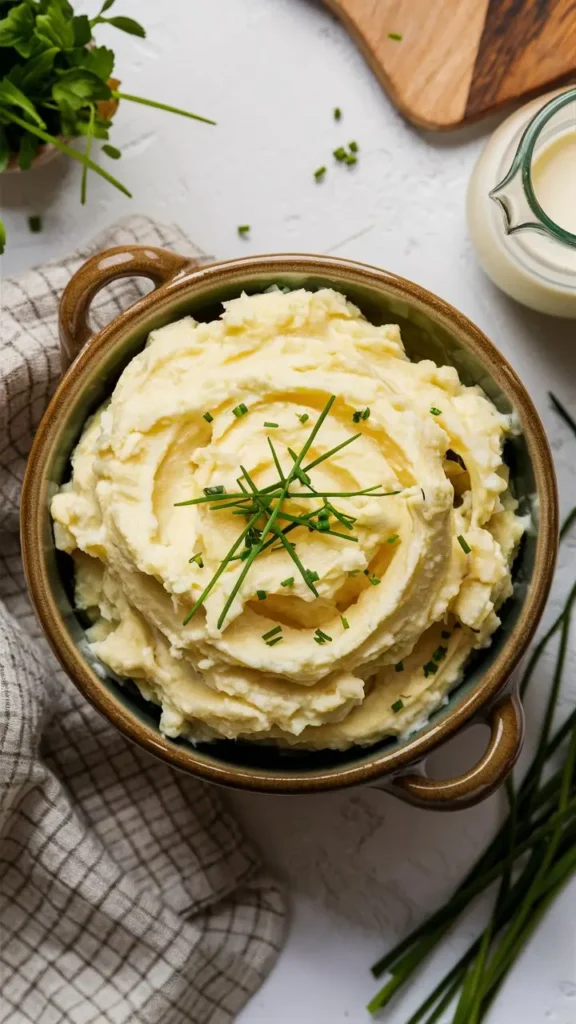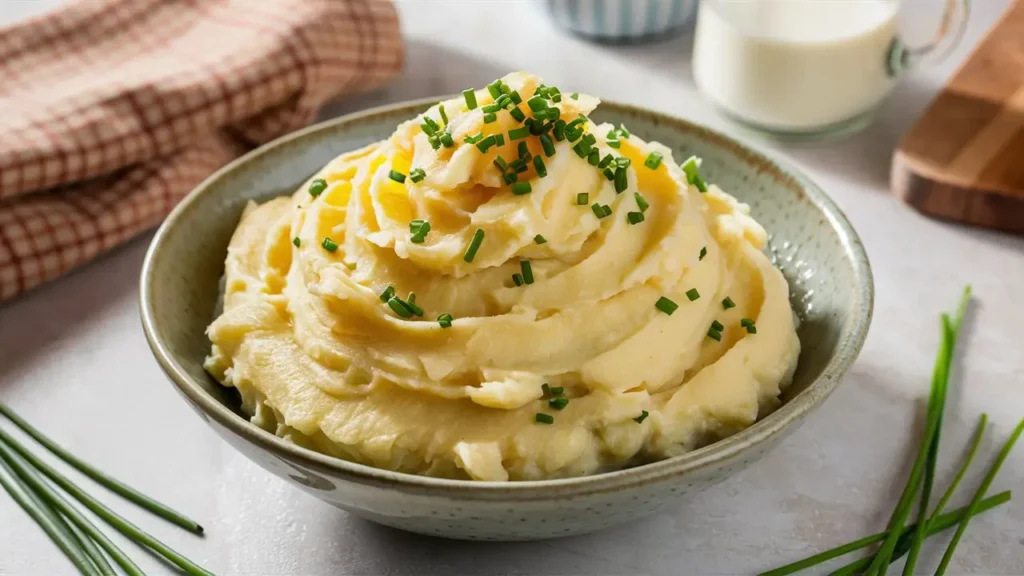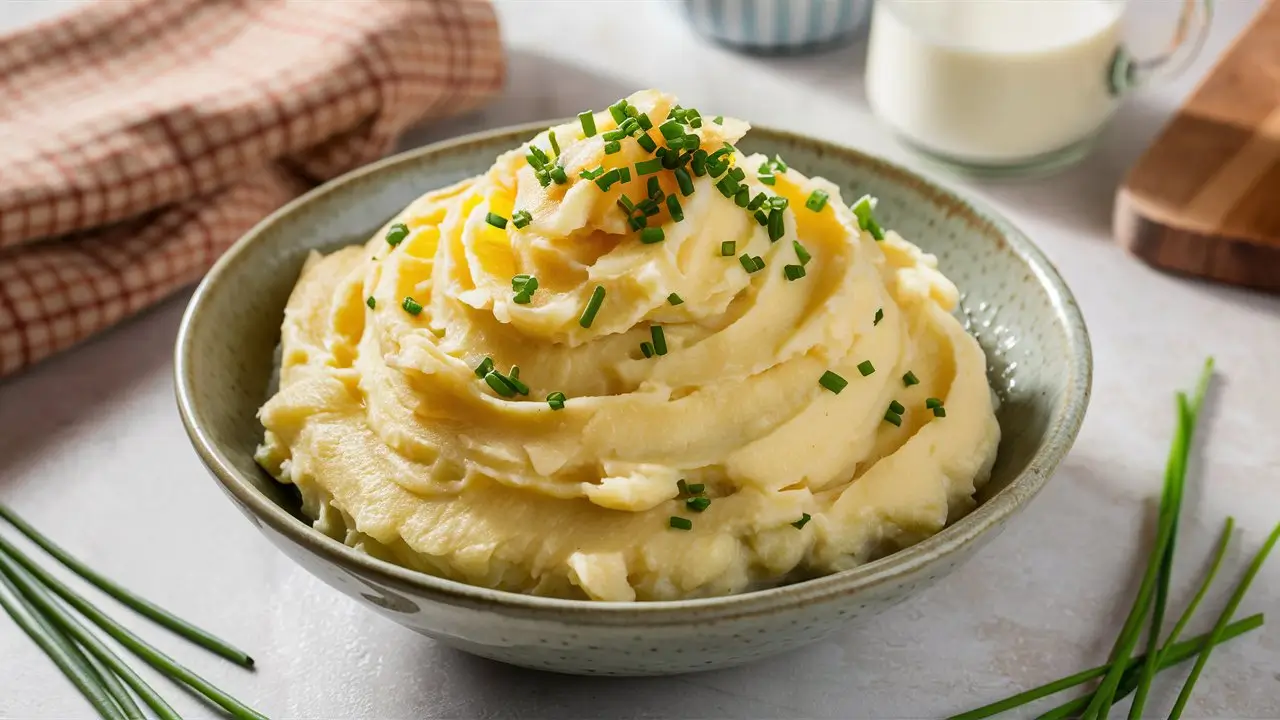Mashed potatoes are a beloved classic side dish enjoyed in countless meals—from comforting family dinners to festive holiday feasts. Their creamy texture and rich buttery flavor make them a universal favorite that complements everything from roasted meats to vegetables.

Why Mashed Potatoes Are So Popular
Mashed potatoes are simple yet incredibly versatile. Their smooth texture and mild flavor allow them to soak up gravies, sauces, and seasonings. Plus, they’re comforting and satisfying—a true crowd-pleaser.
Types of Potatoes Best for Mashing
Not all potatoes are created equal when it comes to mashed potatoes. The best types include:
Russet Potatoes: High in starch, they produce fluffy, light mashed potatoes.
Yukon Gold Potatoes: Creamy with a buttery flavor and medium starch. They create rich, dense mash.
Red Potatoes: Waxy with lower starch; best for chunkier mashed potatoes.
For classic smooth and fluffy mashed potatoes, russet or Yukon Gold are your best bet.
Ingredients List
2 pounds russet or Yukon Gold potatoes, peeled and cut into chunks
1/2 cup whole milk (warmed)
1/4 cup heavy cream (optional, for extra richness)
4 tablespoons unsalted butter
Salt, to taste
Freshly ground black pepper, to taste
Optional add-ins: garlic, sour cream, cream cheese, chives, parsley
Timing & Servings
Prep Time: 15 minutes
Cook Time: 20 minutes
Total Time: 35 minutes
Servings: 6
Step-by-step Instructions for Mashed Potatoes Recipe
Step 1: Preparing the Potatoes
Start by washing, peeling, and cutting your potatoes into evenly sized chunks. This ensures they cook evenly and quickly.
Step 2: Cooking the Potatoes
Place the potato chunks in a large pot and cover with cold water by about an inch. Add a generous pinch of salt to the water.
Bring to a boil over medium-high heat, then reduce to a simmer. Cook for 15-20 minutes until potatoes are fork-tender.
Step 3: Draining and Drying Potatoes
Drain the potatoes well in a colander. Return them to the hot pot off the heat for a minute or two to allow excess moisture to evaporate. This helps create fluffier mashed potatoes.
Step 4: Mashing the Potatoes
Use a potato masher or ricer to mash the potatoes. For super smooth mash, a ricer or food mill is ideal.
Avoid using a blender or food processor, which can overwork the potatoes and make them gummy.
Step 5: Adding Butter and Dairy
Warm the milk and cream gently on the stove or in the microwave. Gradually add butter and warm milk mixture to the potatoes while mashing until you reach your desired consistency.
Step 6: Seasoning the Mashed Potatoes
Add salt and freshly ground black pepper to taste. Taste as you go for the best balance.
You can also add garlic powder or roasted garlic for extra flavor.

Tips for Making Perfect Mashed Potatoes
Use starchy potatoes like russets for fluffiness.
Start cooking potatoes in cold water for even cooking.
Don’t skip drying potatoes after draining.
Warm dairy before adding to keep potatoes hot and absorb better.
Mash gently to avoid gluey texture.
Variations to Try
Garlic Mashed Potatoes
Roast garlic cloves and mash into the potatoes for a rich, savory flavor.
Cheesy Mashed Potatoes
Add shredded cheddar, parmesan, or cream cheese for extra creaminess.
Herb-Infused Mashed Potatoes
Mix in fresh herbs like chives, parsley, or rosemary for a fresh taste.
Vegan Mashed Potatoes
Use olive oil or vegan butter and unsweetened almond or oat milk.
How to Reheat Mashed Potatoes
Reheat gently on the stovetop with a splash of milk, stirring often to prevent drying out. Microwave works too but stir halfway through.
Common Mistakes to Avoid
Overcooking potatoes, causing them to absorb too much water.
Adding cold milk or butter, which cools down the mash.
Using a blender or food processor which makes mash gluey.
Skipping salt in the cooking water and final seasoning.
Serving Suggestions
Mashed potatoes pair well with:
Roast chicken or turkey
Gravy and stews
Meatloaf
Grilled or roasted vegetables
Sauteed mushrooms and onions
Storage Tips
Store mashed potatoes in an airtight container in the fridge for up to 3 days. They can also be frozen for up to 2 months. Reheat gently when ready to serve.
Nutritional Information (Per Serving)
Calories: Approximately 200-250
Protein: 4g
Carbohydrates: 35g
Fat: 7-10g (depending on butter and cream)
Fiber: 3g
Conclusion
Mashed potatoes are a simple yet elegant comfort food staple. With the right potatoes, proper technique, and a few extra touches, you can make creamy, fluffy mashed potatoes that elevate any meal. Experiment with variations like garlic, cheese, or herbs to keep this classic side dish exciting and flavorful. Next time you want a comforting side, try this ultimate mashed potatoes recipe and enjoy a bowl of creamy goodness.
